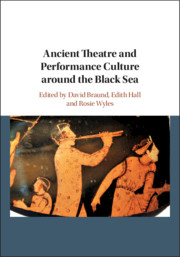Book contents
- Ancient Theatre and Performance Culture around the Black Sea
- Frontispiece
- Ancient Theatre and Performance Culture around the Black Sea
- Copyright page
- Contents
- Figures
- Notes on Contributors
- Preface
- Abbreviations
- Map
- Part I Approaches
- Part II Places
- 4 The Tragedians of Heraclea and Comedians of Sinope
- 5 The Phanagoria Chous
- 6 Theatre and Performance in the Bosporan Kingdom
- 7 Ancient Theatre in Tauric Chersonesus
- 8 Theatre at Olbia in the Black Sea
- 9 Celebrating Dionysus in Istros and Tomis: Theatrical Manifestations and Artistic Life in Two Ionian Cities of the Black Sea
- 10 Ancient Theatres and Theatre Art of the Bulgarian Black Sea Coast and Thracian Hinterland
- Part III Plays
- Part IV Performative Presences
- Epilogue: Dancing around the Black Sea: Xenophon, Pseudo-Scymnus and Lucian’s Bacchants
- References
- Black Sea Index
9 - Celebrating Dionysus in Istros and Tomis: Theatrical Manifestations and Artistic Life in Two Ionian Cities of the Black Sea
from Part II - Places
Published online by Cambridge University Press: 12 November 2019
- Ancient Theatre and Performance Culture around the Black Sea
- Frontispiece
- Ancient Theatre and Performance Culture around the Black Sea
- Copyright page
- Contents
- Figures
- Notes on Contributors
- Preface
- Abbreviations
- Map
- Part I Approaches
- Part II Places
- 4 The Tragedians of Heraclea and Comedians of Sinope
- 5 The Phanagoria Chous
- 6 Theatre and Performance in the Bosporan Kingdom
- 7 Ancient Theatre in Tauric Chersonesus
- 8 Theatre at Olbia in the Black Sea
- 9 Celebrating Dionysus in Istros and Tomis: Theatrical Manifestations and Artistic Life in Two Ionian Cities of the Black Sea
- 10 Ancient Theatres and Theatre Art of the Bulgarian Black Sea Coast and Thracian Hinterland
- Part III Plays
- Part IV Performative Presences
- Epilogue: Dancing around the Black Sea: Xenophon, Pseudo-Scymnus and Lucian’s Bacchants
- References
- Black Sea Index
Summary
Cultural events were important in the life of Greek cities, in close connection with religion: the Dionysia, for example, are primarily religious festivals. We can also wonder if it is possible to distinguish between religious, political and cultural life in a world where taking part in the festivities meant worshipping the gods, honouring citizens or foreigners and attending theatrical performances, music and sport. The theatre, which was the place for the dramatic competitions, could also be the arena for various artists’ shows and for musical and literary competitions; it was also a political space where the benefactors of the city were crowned. The theatre is also a representative phenomenon for the new context of the Greek world after Alexander, which did not break with the tradition of the Greek festivals. As well as the gymnasium, in the Hellenistic period the theatre becomes a marker of the Greek culture, especially in Asia Minor, recently ‘Hellenised’. We could even think that the development of the gymnasium and festivals go together.
- Type
- Chapter
- Information
- Ancient Theatre and Performance Culture Around the Black Sea , pp. 161 - 176Publisher: Cambridge University PressPrint publication year: 2019



